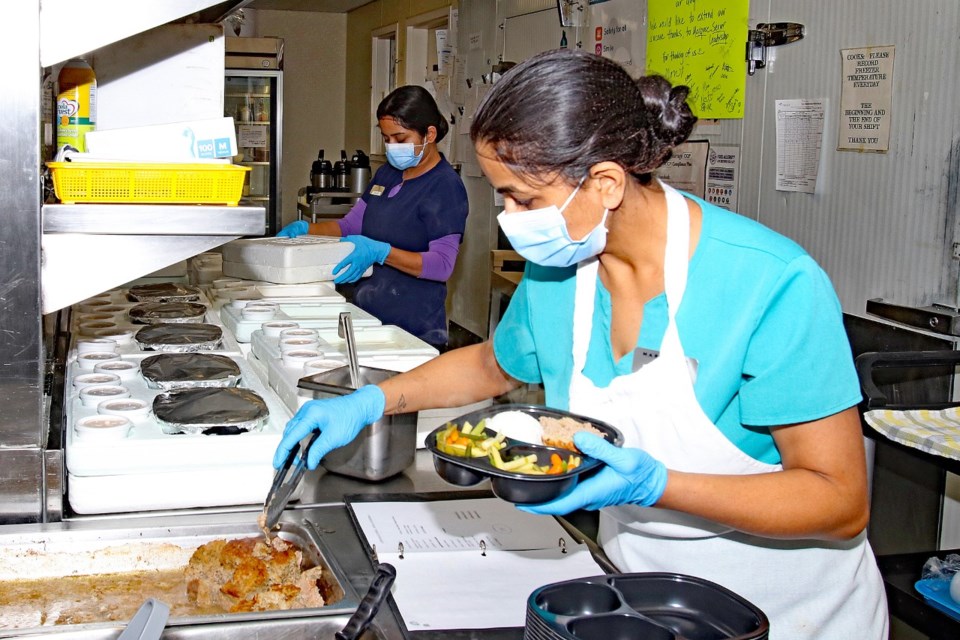The constantly climbing costs of food is hurting those whose incomes are stuck and the pressure on prices is being noticed in Delta by those who help the hungry.
At Deltassist, demand for the food that the Emergency Food Cupboard gives out has almost doubled, said Lisa Pitman, manager of community and senior services.
Grocery bags containing macaroni, canned fruit, meats and pasta, cereal, juice and peanut butter are given out on an emergency basis – both to those who have places to live and the homeless.
“It’s been pretty crazy. Not fun,” she said recently, saying she’s seeing more homeless and seniors. Each week, the Emergency Food Cupboard gives out about 80 of those bags.
In 2020 fiscal year, the program gave out a total of 435 grocery bags.
In 2021, that more than doubled to 945.
And usually when demand increases, the emergency food program puts out a notice on social media to ask for donations, which then come flooding in, but that’s no longer the case as donations are slowing as well.
The cash and price crunch also is visible via the Shop and Drop Program, which Deltassist took over in 2020.
That program was designed to provide groceries to seniors who were isolated because of COVID-19, but the program has continued because of the need in the community.
Shop and Drop helps seniors who may have trouble getting out and about. Volunteers call seniors every second week, give them their grocery list, volunteers do the shopping and deliver the food, then get paid at the door step.
“We have noticed that their grocery shops are getting smaller, so we’ve observed that and we’re thinking that has to do with the rising costs of things,” added Colleen Danes, senior services coordinator at Deltassist “Each week, it’s kind of like, oh, they’re not ordering as much as they used to, so my volunteers are really thinking it has to do with the cost of everything because it’s not affordable anymore.”
Currently, 13 seniors in Ladner are using the service, down from about 30 during the pandemic. A similar service is available in Tsawwassen where 26 seniors are using the Save-On Foods shop program. Five volunteers call seniors weekly and take their orders. Volunteers do the shop and Save-On Foods pays for the delivery service.
Danes said food security and housing are the two most important issues for seniors.
“I’m very passionate at making sure that we keep these programs going and that nobody goes without getting groceries,” Danes said.
At KinVillage, CEO Dan Levitt said everyone struggles with inflation, but seniors are affected in a much greater way.
“If you’re on a fixed income … when costs go up you have to make tough decisions,” he said. “People can only downgrade their food so much, so that at one point there isn’t a cheaper option. That’s a significant issue.”
Ladner resident Loretta Schellert, 81, doesn’t like the constantly increasing food bills.
She estimates her grocery bill has jumped by 75 per cent in the last year, to $500 a month.
“Right now, I don’t feel there’s a lot to worry about. I sure don’t like seeing the food go up and up and up in price.”
However, she has a lifelong habit of living frugally and managing money properly.
“I’ve always managed my money and done a budget. I can afford it, but I can say I don’t like it,” she added.
She cared for her disabled husband for 32 years and now still manages in her three-bedroom house in Ladner where she still does all the housekeeping although she pays for a gardener.
Once a month, Deltassist takes her shopping so she can stock up on supplies that she’s put on a grocery list on her computer.
She only orders in food if her kids and grandchildren come to visit.
She checks the grocery flyers every week.
Sharon Davis, administrator at the South Delta Food Bank, said the cost of food has risen “drastically.” Every week, the food bank has to buy fresh food such as produce, meat and dairy products.
“The biggest jump we’ve been seeing is in dairy, milk and eggs, she said.
The food bank has about 100 clients, up from during the middle of the pandemic when there were about 60.
Despite the cost crunch, the food bank is still stuffing the bags with the same amount of nutritious food. The ingredients and amount in the weekly food hampers haven’t changed.
“They’re still given the same amount,” said Davis. “We don’t cut back on what we give to the clients that come in.”
Increasing costs of ingredients also have led Meals on Wheels to raise their prices last year from $7.50 to $8 a meal.
“We’re trying not to raise our costs for seniors … but our costs have gone up again with COVID,” said Linda Eastdown, meals and driver coordinator.
She said the cost for a six-week supply of supplies from which to prepare meals has jumped in the past year from about $1,200 to $1,800. There’s also a $16 gas surcharge for the wholesaler to deliver the food.
Meanwhile, Meals on Wheels has also had to pay their volunteer drivers more – .55 cents a km instead of .50 cents, for their gas mileage.
The service provides hot meals to a total of about 45 seniors in Ladner and Tsawwassen.




